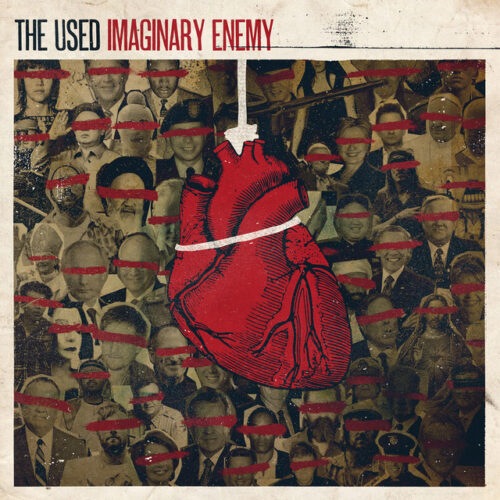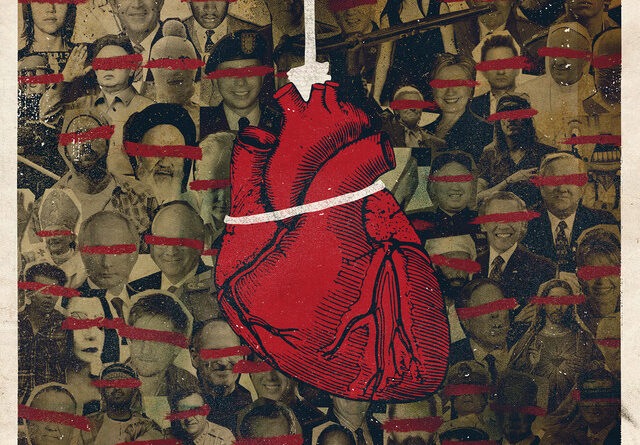HEAVY MUSIC HISTORY: Imaginary Enemy – The Used
Released back in 2014, Imaginary Enemy is THE USED’s most politically-charged piece, and the first album that saw the band’s iconic post-hardcore sound deviate into something with much more pop-sounding influence.
Prior to its release, THE USED had built a reputation for their mainly heavy, angsty albums that touched on topics such as pain, addiction, and love. Imaginary Enemy came along and offered something completely different, which resulted in mixed reviews from fans and critics alike.
“…This is a pop album. Several songs have a soft open, piano and synth play an integral part to a majority of the album and the screams are few and far between. That’s not to say that the sound is bad, it’s just different”, wrote Kyle Schultz of it’s all dead when the album was released. Schultz went on to give Imaginary Enemy a rating of four stars out of five, acknowledging how THE USED had shifted in sound, but still appreciating the album’s boldness.
This shift mirrors the mid-2010 trend that saw heavier artists transitioning to something lighter and more mainstream-influenced, but it could also be attributed to the band’s unconventional writing process for the album that went against how they usually work.
The band created the lyrics and melodies of the tracks first, recording the vocals before anything else. Once the vocals were laid down, the band erased all the music and rewrote it to fit the vocals, which is what we hear on the album today. This process, described by bassist Jeph Howard as being “backwards” for the band, was ultimately essential, as they had already scrapped 12 songs before producer John Feldmann‘s involvement in the album.
John Feldmann, who had previously worked with THE USED on almost every album prior, played a crucial role in the shaping of Imaginary Enemy. Jeph Howard highlighted Feldmann’s ability to push vocalist Bert McCracken, and how their dynamic and passionate working relationship helped to create something compelling:
“Feldmann is a very interesting character and him and Bert work together very well. I think it’s because Feldmann pushes Bert – he pushes him very strongly. Some people work best being pushed and I think they have this dramatic relationship in that way. I think there’s some passionate thing about Feldmann and Bert working together, they click. I think that’s why we went back to him for this record, there’s that click that Bert really wanted”.
Imaginary Enemy is an 11-track album full of anti-establishment anthems, looking deeply into themes of political unrest, equality, and revolution. One of the major standout tracks on the album is The Song To Stifle Imperial Progression (A Work In Progress), with it holding a particular significance for Bert McCracken, as it reflects his desire to challenge governmental policies and question the overall status quo.
“It’s something that I kind of always wanted to do with our music, since I was little. That was to say “fuck you” to the government in a big way, and I think that it’s really ok to say that about the United States government, about the policies and ideas of what’s going on. We know what we’ve done is fucked up, and that some of these things don’t work and it’s really confused. I think we’re asking these questions because we love where we live, where we grew up. We love the United States”, Bert explained.
On April 1st 2014, Imaginary Enemy was released on Hopeless Records and the band’s own G.A.S. Union, a free music record label. “It’s a union for artists. Our ideology is if you’re not producing music, or you’re not making music or if you’re not working with the touring side, then you don’t deserve to make any money from music. And it’s all the people who don’t do what I just said who are making all the money. We think we can change that”, Bert McCracken explained.
Since the release of Imaginary Enemy, it doesn’t appear that any further albums have been released on G.A.S. Union, however, the concept remains a good reflection of THE USED’s ethos and their desire to challenge industry norms (something that’s also reflected in the album).
Imaginary Enemy debuted at number 14 on the Billboard 200 chart in the US, marking THE USED’s fourth consecutive top 20 album. In the UK, it reached number 78 on the Official Albums Chart. It also hit number 1 on the Independent Albums chart, and the album’s lead single, Cry, received significant airplay on radio stations. Revolution was also released as a single in September 2014, with Cry and Revolution being the only two singles released from the album all in all. Imaginary Enemy marked the last album with Quinn Allman on guitar and as a member of the band, with him leaving in 2015, ending a successful stint of 14 years.
Today, THE USED have 9 studio albums to their name and continue to be one of the most iconic and admirable bands of their generation. Their recently released music combines their earlier angst with the pop influence from Imaginary Enemy, and the band continues to perform across the world.

Imaginary Enemy was originally released on April 1, 2014 via Hopeless/G.A.S. Union
Like THE USED on Facebook.

